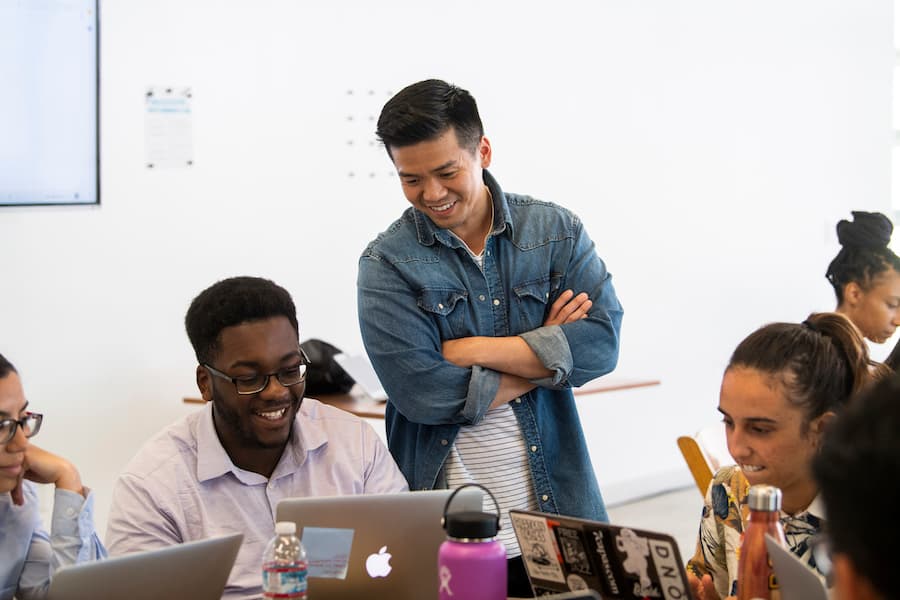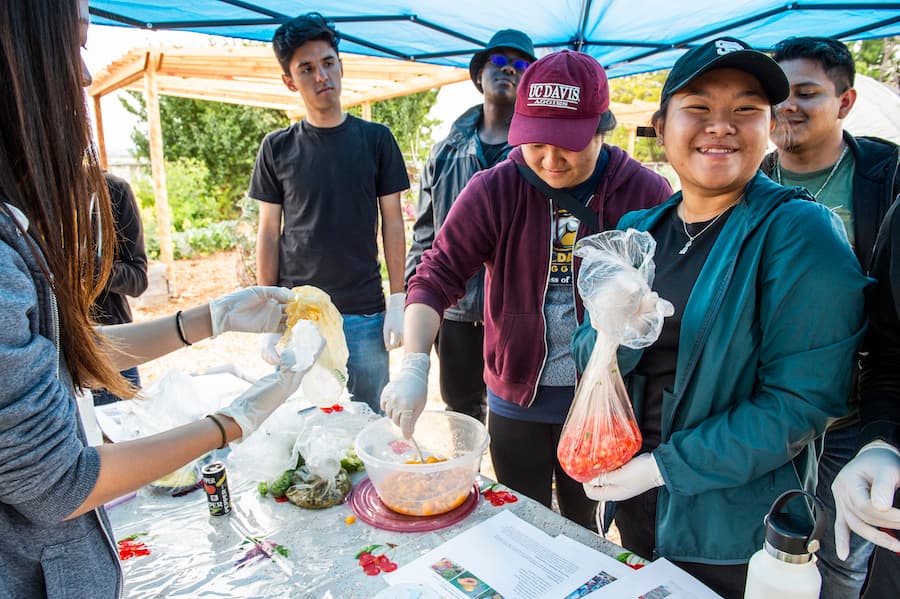Creating Equitable Talent Pipelines Through Community Industry Partnership
“It is not just what you know, but who you know,” is a commonly exchanged saying that underlies a complex reality: Social capital matters for mobility. But for first-generation college students, that reality presents a particular challenge for their career trajectories—and even more so as the pandemic continues to exacerbate disparities for first-generation students in the era of remote learning.
Most of us can think back to early mentors and work experiences—introduced by friends or family—that helped us enter the professional world. But this is a privilege. For most first-generation college students, predominantly young people of color and those from low-income backgrounds, access to early professional experiences where they can explore their ambitions and passions is significantly limited. As the pandemic refigures the professional landscape, these enriching opportunities are even harder to find.
Those experiences, usually in the form of internships, are indispensable for any student. They provide the vital opportunity to nurture one’s professional future and guide their career path.
To expand that opportunity for first-generation college students, and in turn cultivate more equitable talent pipelines across the professional world, we must increase access to paid internships for young diverse students.
According to the Center for First-Generation Student Success’ most recent reporting, 56% of undergraduates nationally are first-generation college students. Those millions of students should not have to choose between an hourly summer job that does not accelerate their professional ambitions and an internship that would.
But organizations with their own relationship architecture can help in a big way.
Tapping those relationships can create more paid internships for first-generation college students that expand their career apertures and ignite their professional successes. Making this intentional effort not only benefits students, but also employers by creating a stronger, fresher, and more diverse talent pipeline that drives better organizational performance.
Emerson Collective launched the FirstGen Internship program to help power up the next generation of leaders and change-makers across our Bay Area community. We activated our Emerson network and connected College Track first-generation college students to paid summer internships at organizations in our portfolio. College Track serves primarily low-income, first-generation students of color by providing them academic and financial support over a ten-year period to get them to and through college.
The FirstGen Internship program expanded from 35 FirstGen interns in 2019, to more than 60 interns in 2020, and will have 100 interns in 2021, spanning roles at education-, climate-, and health-technology companies; biomedical research labs; law firms; and social-justice nonprofits. Like 2020, the majority of the 2021 internships will be remote as a result of the pandemic.
JAMARC ALLEN-HENDERSON, 2020 FIRSTGEN INTERN"It has inspired me to go after a master’s degree to get more skills so that I can be an even better candidate for future jobs. The internship was a life-changing event for me."
Through the FirstGen Internship program, College Track students were able to gain communication, analytical, and project-management skills, while building their own networks and social capital to strengthen their paths toward professional mobility. We were also thrilled to see longer-term opportunities emerge from half of the internships in 2019, and in 2020, full or part-time opportunities were offered to 11 interns despite the pandemic, FirstGen intern Jamarc Allen-Henderson, who worked in a COVID lab at Color, being one:
I was able to get to work within the industry that I plan to pursue soon in the biology field. I had many opportunities to grow in the internship. In addition to that, I was offered a position at my internship after it was over. It gave me a glimpse of the myriad possibilities that I can take to work in the industry. It has inspired me to go after a master's degree to get more skills so that I can be an even better candidate for future jobs. The internship was a life-changing event for me.
These internship experiences are transformative for employers as well. La Cocina, a 2020 nonprofit internship host working in food entrepreneurship, described how its FirstGen intern helped grow its work and perspective:
I would encourage our intern to, in addition to asking questions, always feel free to make suggestions, vocalize her thoughts, and to hold back on ever second-guessing them. A small org like ours is hungry and excited for new perspective and I can imagine this is the case across many other nonprofits.
Over the past two years that we’ve offered the FirstGen Internship program, we’ve been fortunate enough to gain a few key insights on what it takes for a model like this to bloom in more regions and communities, and hopefully, inspire organizations to create similar programs through their relationships:
The Power of Networks
We all have personal and professional networks, often spanning various industries. But they are too often homogenous and siloed from the students and young people who could gain most value from them. Any philanthropic funder can tap its existing network of organizational relationships for internship sites by strategically reaching out to mission-aligned partners that can host internship opportunities.
A Community-driven, Student-centered Approach
It’s crucial to partner with a community-based organization working alongside first-generation college students to lean on their expertise in student development and how to support young people in your particular community. There is a number of organizations across the country that are focused on college and career access for underserved students, like College Track.
The Importance of Resourcing Paid Internships
Ensuring compensation will enable interns to focus exclusively on their summer internship without needing additional summer jobs to cover their cost of living is critical for driving wider access and equity for all students. Subsidizing intern compensation through grants to support nonprofits in offering pay that is commensurate with professional roles may be necessary.
Wrap-around Programmatic Supports
Determine internal staffing needs to stand up programming for interns that develops skills and builds community. Consider the creation of workshops on professional etiquette, communication, financial literacy, resume building, and networking to support a more streamlined and engaging experience for interns.Larger Company-wide Equity Anchors
Ground the program in larger equity, diversity, inclusion, and belonging efforts to enhance the experiences of first-generation student interns—and the organization’s culture.
With these in mind, you can help forge a more equitable talent ecosystem that can power up stronger people, families, and communities—helping create more educational and professional opportunity for first-generation students, mostly young people of color from low-income communities, during a time in this country when it’s become exceedingly clear that racial and economic justice are vital to our collective future.
BIANCA DIRIGE, 2020 FIRSTGEN INTERN"As first-generation students, we have a lot to teach those in the professional world. Our experiences can really shape the future for others that follow after us."
2020 FirstGen intern Bianca Dirige describes the promise of this collective future best, reflecting on her own biomedical-research internship at Stanford, and the ways it empowered her personally and professionally in spaces where students like her have been underrepresented:
I feel that I really learned how to speak up and share my thoughts in settings where I may feel like I have no platform. As first-generation students, we have a lot to teach those in the professional world. Our experiences can really shape the future for others that follow after us.
Now let’s all do our part in helping to shape that better future for as many young professionals as possible.

